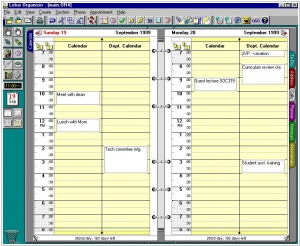Lotus Organizer
Updated: July 30, 2023
Lotus Organizer was a popular personal information management software developed by Lotus Development Corporation in the 1990s. It offered users a comprehensive suite of tools to manage their day-to-day activities, including calendars, to-do lists, contacts, and notes. The software provided a user-friendly interface that allowed users to easily organize and schedule their appointments, tasks, and events. Lotus Organizer also featured synchronization capabilities with early mobile devices and allowed users to print their calendars and contacts for offline reference. However, with the advent of more advanced personal information management software and the decline of Lotus Development Corporation, Lotus Organizer gradually lost its prominence and was eventually discontinued. Despite its discontinuation, it remains a notable part of the history of personal productivity software, having played a significant role in helping individuals stay organized in a pre-smartphone era.
Lotus Organizer was a personal information manager (PIM). It was initially developed by Threadz, a small British software house, reaching version 3.0. Organizer was subsequently acquired by Lotus Development Corporation, for whom the package was a Windows-based replacement for Lotus Agenda. For several years it was the unquestioned market leader until it was gradually overtaken by Microsoft Outlook.
See also: Top 10 Productivity software
See also: Top 10 Productivity software
1996. Lotus Organizer Web Calendar allows to share calendars via the Internet

IBM has unveiled the web-based version of Lotus Organizer 97 known as Lotus Organizer 97 Web Calendar. This innovative product allows geographically separated teams to collaboratively manage and share calendars over the internet. Operating as a CGI-application hosted on an internet or intranet server, it can be accessed through any web browser. With Lotus Organizer 97 Web Calendar, you can effortlessly share your calendar with colleagues, granting read-only permissions and safeguarding it with a password. Furthermore, IBM has advocated for its calendar sharing protocol, known as the Internet Calendar Access Protocol, as an open and widely adopted standard.

